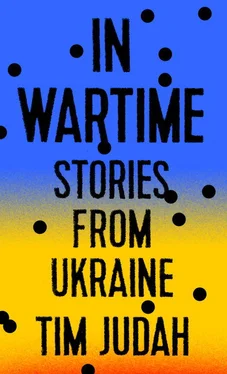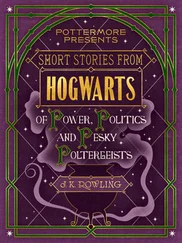In a small village everyone has long memories of other people’s history. Nadya Shermet, aged sixty-three, is the sister of Galya Malchik. She lives in Kiev and works in the office managing property belonging to the municipality. She is about to retire and intends to return to the village. The sisters think perhaps only 400 died here in the Holodomor , while their brother Sergiy Makarov told me he thought it was fewer than thirty. I find it hard to understand how the numbers can vary so enormously in such a small place. Surely in a village like this, everyone would know exactly who had died, even if the reason why had been a taboo topic for so long. According to Nadya, Valentina’s father was a kurkul while theirs was a tractor driver in the kolkhoz or collective farm. Because he was an employee he got paid in food and had no land to be forced out of; in this way, the family was fed in hungry times. Valentina, however, has the inherited psychology of the kurkul, she said, which is to say that of “someone who has had something taken away from them,” which would explain why they were “angry” and might exaggerate what all would nevertheless agree were communist crimes. Galya concurred and remembered that after the war Valentina’s family got rich again because her father became the chief accountant in the kolkhoz . Hence his daughters had “silk dresses and we had cotton ones and were envious.” Still, they had it better than others. Their mother made them bread and little pyrizhky pies to take to school, but those whose fathers had not come back from the war did not have anything, so they shared what they had with them.

Galya Malchik. Karapyshi, March 2015.
As in all Ukrainian villages the population is predominantly elderly. Galya said “there are almost no children in the village.” When she was young “there were four or five children in every house and now there are only pensioners sitting in their homes.” Just as Nadya is intending to retire here, others have already done so after a lifetime working in Kiev. Between the village and the city there are strong links because many of those who work in the cities, and those who migrated there as Ukraine industrialized after the war, maintained their links with their home villages. Typically their children would spend their summers in the village. They would have fun if they were lucky, but dig, weed and water if they were not.
Today the pensions of many who live here are supplemented by income from land. Like everywhere else those who worked in the kolkhoz got parcels of land when it was broken up after the dissolution of the Soviet Union. Either, like Galya, they are too old to farm the land, or they don’t have the money to do so. So it is rented to a company which then groups as much of it together as possible, in effect farming much of the same land as the kolkhoz had. The person who owns the land usually gets a portion of the income of the crop sold but can take some of the crop too. Even if a villager wanted to farm their land it might be virtually impossible. For example Galya’s 2.75 hectares is surrounded by plots belonging to others, so she could not even get to it, let alone drive a tractor to it, without crossing their land. “It is just part of one big field.”
The law does not allow people to sell this land but you can pass it on when you die. Galya herself inherited her plot from her sister. In some parts of the country big companies run the farms but in others the companies tend to be smaller. Here, said the sisters, most of what makes money is controlled by one local politician and his wife, who have built themselves a fancy home and drive a fancy car. Galya described the wife as a “famously cruel bitch.” They were the real power here, rather than Sergiy the mayor. There are a few shops in town, and when someone not connected to the Karapyshi power couple tried to open one he was told in no uncertain terms that the next day it had better “no longer be here.” I asked the sisters why they and others put up with this, and Galya shrugged and said: “Ukrainian villagers are very obedient.” It was rare for them to rise up against authority. Nadya pointed to an ambiguity. Both of them had been members of the Communist Party, and had mixed feelings about this past. For sure communism brought suffering but now people suffered in a different way and, since they were used to a life of not complaining, “they” (meaning those with power) could get away with giving them just “a piece of freedom.”
During the Second World War the Germans passed through the village but there was no fighting here. Before the Soviets evacuated they took most of the cattle and other animals. The rest were taken by the Germans, who nonetheless did not give the kolkhoz land back to the locals. A few joined the German-recruited Ukrainian police and then fled at the end of the war. I asked them how they felt about this period and Nadya said: “We were patriotic Soviets,” although she added that there was not much alternative on offer here at the time. But this memory does not mean they confuse a former patriotism with an admiration for Vladimir Putin and his Russia, which wants to claim the sole mantle of the glory of the Soviet Union’s role in the crushing of the Nazis, while forgetting the Holodomor , the Nazi-Soviet pact, Stalin’s purges and so on. Nadya said of Russians, “We were brother nations” and Galya added, “Until last year when things changed with the annexation of Crimea.” But whatever has happened they think that Putin is the problem, not Russians with whom good relations can be restored. Putin does not come in for as much bile as I had expected. More is reserved for people closer to home. Nadya told me that army officers she knows complain of unclear chains of command and illogical decision-making which her friends say is impossible to explain. But their deepest scorn is reserved for Britain and the U.S. They expected them to give weapons to the Ukrainian army so it can better fight the Russians, because until now all they had given the country, said Nadya, was the equivalent of feeding “a fly to a dog”—in other words, nothing.
6.
Chernobyl: End and Beginning
“The nuclear meltdown at Chernobyl,” wrote Mikhail Gorbachev, the last Soviet leader, in 2006, “even more than my launch of perestroika, was perhaps the real cause of the collapse of the Soviet Union five years later. Indeed, the Chernobyl catastrophe was an historic turning point: there was the era before the disaster, and there is the very different era that has followed.”
Gorbachev, who had been in power just over a year when the catastrophe happened, may overstate the case but there is little doubt that it was one of those pivotal moments in history when it was nudged in a particular direction that it might not have taken otherwise. The explosion happened at 1:23 in the morning of April 26, 1986. At first there was confusion as to what had occurred and how serious the situation was. It was only at 14:00 on April 27 that people in the town of Pripyat, three kilometers away, where most of the plant workers and their families lived, were evacuated. They were told it would be for three days, but it was forever.
The news first emerged abroad on April 28 when routine testing on the shoes of a worker returning from the toilet at a nuclear plant in Sweden, 1,100 kilometers away, detected abnormal levels of radiation. During the day it was determined that this had come from the Soviet Union, and that night the Soviet authorities admitted that something had happened at Chernobyl. Gorbachev argues that there was no deliberate attempt to cover up what had happened, which was then and is still widely believed. He claims that the authorities themselves did not understand the gravity of the situation. Then, he argues, the disaster, “more than anything else, opened the possibility of much greater freedom of expression, to the point that the system as we knew it, could no longer continue.” Ordinary people lost what faith they had in the system and a direct line can be drawn from here to the demise of the Soviet Union. Ukrainians, for example, now understood that the plant was not under their control but run from Moscow. Hence it made sense for many people, as the USSR began to unravel, to think that the authorities in Kiev should be in control of what was going on in Ukraine.
Читать дальше













